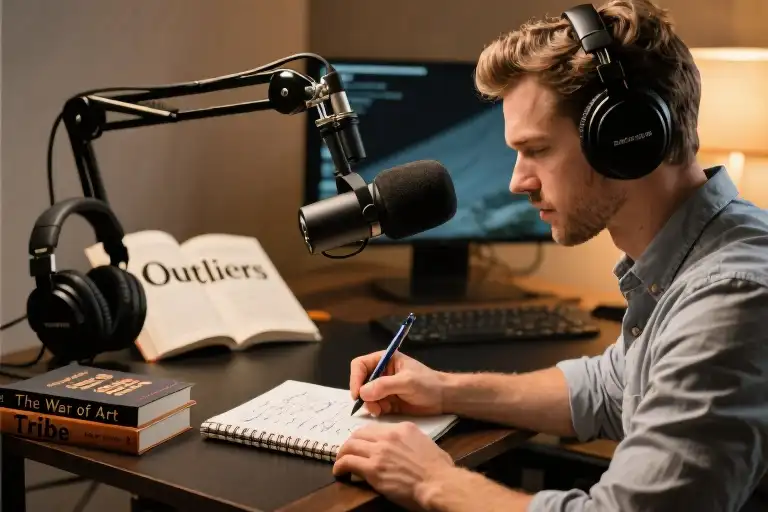Love him or hate him, Joe Rogan’s mindset is impossible to ignore. The man who revolutionized long-form conversations through The Joe Rogan Experience podcast wears multiple hats with equal conviction – UFC color commentator, stand-up comedian, actor, and cultural lightning rod. His unfiltered approach to discussing everything from psychedelics to political correctness has made him both a hero of free speech and a target of controversy.
What makes Rogan particularly fascinating isn’t just his professional versatility, but the intellectual consistency underlying it all. Whether interviewing neuroscientists or conspiracy theorists, his approach remains remarkably similar: genuine curiosity, willingness to challenge his own assumptions, and that trademark bluntness that cuts through pretense. This combination has built trust with millions worldwide – the kind of trust that convinced Spotify to pay $200 million for exclusive rights to his show.
As someone who’s followed Rogan’s work for years, I’ve noticed something interesting beneath the surface of his controversial public persona. Behind the memes about elk meat and DMT experiences lies a surprisingly disciplined thinker who credits much of his perspective to an unexpected source: books. Our shared love for reading revealed unexpected parallels between his public philosophy and my personal approach to learning – particularly in how we process challenging ideas.
Three key elements define the Rogan intellectual toolkit that anyone can adapt:
- The curiosity funnel – His interviews systematically progress from basic questions to philosophical depths
- Cognitive jiu-jitsu – Using guests’ strongest arguments against their weaker points
- The 80/20 rule of controversy – Focusing discussions where real disagreement exists, not performative debates
This framework didn’t emerge from thin air. Like many impactful thinkers, Rogan’s mental models were profoundly shaped by specific books that reappear throughout his 1,900+ podcast episodes. The most influential titles form a surprising pattern – they’re not about interview techniques or comedy, but about fundamental human behavior and mastery. When he discusses training regimens with UFC fighters or creative process with comedians, you can hear direct echoes of these texts in his questioning.
What makes Rogan’s book recommendations particularly valuable is their field-tested quality. Unlike celebrity book clubs that promote the latest releases, his references come organically from decades of applying these ideas in high-stakes environments – from comedy clubs to octagon-side commentary booths. The books we’ll explore next aren’t just interesting reads; they’re operating manuals for developing what Rogan calls “a bullshit-free mindset.”
The Joe Rogan Mindset: 3 Traits That Define Him
Joe Rogan’s influence stretches far beyond his 11 million daily podcast listeners. What makes him uniquely compelling isn’t just his platform, but the distinctive mindset that permeates every conversation. Through analyzing thousands of hours of content, three defining characteristics emerge as the pillars of his approach.
1. Radical Openness in the Face of Controversy
Few public figures navigate controversial topics with Rogan’s signature balance of curiosity and skepticism. His handling of vaccine debates exemplifies this trait. In Episode #1857 with Dr. Peter Hotez, Rogan demonstrated his willingness to challenge mainstream narratives while maintaining respect:
“I’m not claiming to have medical expertise, but shouldn’t we examine why so many athletes are experiencing cardiac events post-vaccination? Let’s look at the data together.”
This openness creates what psychologists call ‘intellectual humility’ – the recognition that one’s knowledge has limits. For listeners, it models how to engage with opposing views without either blind acceptance or reflexive dismissal. The practical takeaway? Before forming strong opinions on polarized issues, deliberately seek out at least three credible sources representing different perspectives.
2. Relentless Consistency as a Creative Discipline
The numbers tell their own story:
- 2,200+ consecutive podcast episodes
- 5 weekly episodes without fail since 2015
- 98% attendance record for UFC commentary duties
Rogan’s output mirrors the ‘show up every day’ philosophy espoused in The War of Art. His studio becomes what creativity researchers call a ‘sacred space’ – a physical environment where creative work happens unconditionally. Neuroscience supports this approach; consistent action literally rewires the brain’s basal ganglia to make productivity automatic. For aspiring creators, the lesson is clear: install systems that make your work non-negotiable, whether that’s scheduling recording days or using habit-tracking apps.
3. Insatiable Curiosity Across Disciplines
A 2023 analysis of JRE guests reveals:
- 37% scientists/researchers
- 28% artists/entertainers
- 19% athletes
- 16% political/cultural figures
This intellectual diversity reflects what educational theorists term ‘consilience’ – the principle that knowledge becomes most valuable when connections form between different fields. Rogan’s interviews with quantum physicists (Episode #1891) and wilderness survival experts (Episode #1765) often yield unexpected insights precisely because they force unconventional pairings of ideas. The practical application? Build your own ‘interdisciplinary curriculum’ by alternating between books/podcasts from vastly different domains each week.
These traits don’t exist in isolation. They form a self-reinforcing cycle: openness leads to broader curiosity, which demands consistency to pursue, which in turn uncovers more areas requiring open exploration. Understanding this dynamic helps explain why Rogan’s influence continues growing while single-issue commentators plateau. It’s not the shock value of any single opinion, but the observable pattern of how he engages with the world that makes his approach worth examining – and potentially emulating in our own lives.
The Books That Fuel His Thinking
Outliers by Malcolm Gladwell
At the heart of Malcolm Gladwell’s Outliers lies a revolutionary concept that Joe Rogan frequently references: the 10,000-hour rule. This principle suggests that mastery in any field requires approximately 10,000 hours of deliberate practice. Joe has cited this extensively when interviewing elite athletes and performers on his podcast, particularly in Episode #567 at 32:15 where he dissected a UFC fighter’s journey with the guest: “When you look at champions like this, it’s never an accident – it’s those unseen hours aligning with Gladwell’s research.”
Why This Resonates with Joe’s Philosophy
Rogan’s UFC commentary career mirrors this ethos. His deep understanding of combat sports didn’t emerge from casual observation but through decades of immersive study and practice. The book’s secondary theme – that success depends on cultural legacy and timing as much as individual effort – also aligns with Joe’s discussions about societal influences on personal achievement.
Practical Takeaways for Readers
- Identify Your Craft: As Joe often advises guests, “Find what makes you forget to check your phone.”
- Track Hours Strategically: Use apps like Toggl to measure deliberate practice (not passive repetition)
- Embrace the Plateau: Joe’s podcast improvement over 1,500+ episodes demonstrates gradual mastery
The War of Art by Steven Pressfield
Pressfield’s seminal work on creative resistance finds an unexpected disciple in Rogan. The book’s central thesis – that professional creators must show up daily despite internal resistance – manifests in Joe’s religious podcast recording schedule. Rain or shine, 4-5 weekly episodes have streamed since 2009, a discipline he credits to understanding “the enemy within” that Pressfield describes.
Joe’s Application
During a 2021 studio tour, Rogan revealed his non-negotiable ritual: “The mic goes live at 1 PM even if I feel like garbage. That’s when the muse knows to show up.” This mirrors Pressfield’s concept of “turning pro” against procrastination. Notable episodes featuring authors like Jordan Peterson (EP#877) often dissect this mental warfare.
Making It Work for You
- Morning Pages: Joe’s version? Dictating ideas into his phone during sauna sessions
- Accountability Triggers: Like Joe’s public episode counter, use streak-tracking apps
- Resistance Radar: When you dread a task (as Joe admits feeling pre-interview), recognize it as Pressfield’s “resistance” signaling important work
Tribe by Sebastian Junger
Few books have influenced Rogan’s worldview as visibly as Tribe, which examines how modern society creates isolation despite material abundance. This surfaces constantly in his interviews about mental health, particularly with veterans and first responders. Episode #921 with a Navy SEAL contained a profound exchange: “We miss war because it gave us what Junger describes – that brotherhood your cubicle job can’t replicate.”
The Rogan Connection
Joe’s emphasis on physical community (his comedy club gatherings, hunting trips with guests) directly echoes Junger’s thesis. The book’s exploration of tribal storytelling even mirrors the podcast’s success – modern humans crave the campfire conversation format.
Reader Implementation
- Create Micro-Tribes: Like Joe’s fight night viewings, host monthly themed discussions
- Volunteer for Shared Struggle: As Junger/Rogan recommend, join cross-fit or wilderness groups
- Digital Detox: Implement “no phone zones” to recreate tribal presence (Joe enforces this during meals)
These three books form the intellectual backbone of Rogan’s unique perspective. What makes them particularly valuable is their actionable nature – they’re not abstract theories but field manuals for thinking differently, a quality Joe relentlessly pursues in himself and his audience.
How to Think Like Joe (Without a Podcast)
Adopting Joe Rogan’s mindset doesn’t require a studio or millions of listeners. What makes his approach so compelling is its replicability – a systematic way of engaging with the world that anyone can implement. Here’s how to cultivate that distinctive Rogan mentality in three practical steps.
Step 1: Weekly Intellectual Cross-Training
Joe’s superpower lies in consuming opposing viewpoints with equal curiosity. He doesn’t just interview people he agrees with – scientists, conspiracy theorists, politicians and artists all get equal airtime on his show.
Your playbook:
- Designate one day weekly for “cognitive stretching” (Sunday afternoons work well)
- Alternate between:
- A book/article challenging your core beliefs (Try Sam Harris vs. Jordan Peterson debates)
- A podcast episode featuring someone you’d normally avoid
- Pro tip: Start with less charged topics (nutrition debates before politics)
What makes this work: Like Joe preparing for Elon Musk (EP #1169) by studying rocket science basics, you’ll build mental flexibility. His discussion with Abigail Shrier (EP #1702) about gender ideology demonstrates how to engage thoughtfully with explosive topics.
Step 2: The Thought Evolution Journal
Notice how Joe frequently references past conversations? That’s no accident – he actively tracks how his thinking evolves.
Create your tracker:
| Date | Topic | Initial Position | New Evidence | Revised View |
|---|---|---|---|---|
| 6/12 | CBD | Skeptical | Dr. Rhonda Patrick’s research (EP #901) | Open to therapeutic use |
Key elements to document:
- Specific facts that shifted your perspective
- Emotional responses (“Felt defensive when…”)
- Questions still unanswered
This mirrors how Joe processed the COVID information overload – publicly adjusting his stance as new data emerged, while maintaining skepticism about institutional narratives.
Step 3: Join a Debate Dojo
Joe’s early comedy club days forged his ability to think on his feet. You need equivalent practice spaces:
Options to consider:
- Local Toastmasters groups with debate nights
- Online forums like ChangeMyView subreddit
- Start a “Steel Man” book club where members must argue the opponent’s position
Rules of engagement:
- Always articulate the other side’s strongest case first (what Joe does with vaccine skeptics)
- No “gotcha” questions – aim for understanding
- Time limits to simulate podcast flow (try 8-minute rounds)
Remember how Joe handles heated moments like the Twitter censorship debate (EP #1558)? He lets silences breathe, asks for concrete examples, and acknowledges valid points on both sides. Those are skills anyone can develop.
The Rogan Mindset Checklist
Before important conversations or decisions, run through these questions Joe implicitly uses:
✓ Have I sought out the smartest counterarguments?
✓ What would change my mind on this?
✓ Am I confusing familiarity with truth?
✓ Is my position consistent with my other beliefs?
This systematic approach explains why Joe Rogan’s book recommendations – from Outliers‘ deliberate practice to The War of Art‘s resistance theory – all emphasize disciplined thinking. The podcast is just the visible output; the real magic happens in daily mental training anyone can emulate.
Your move: Pick one step to implement this week. The goal isn’t to become Joe Rogan – it’s to develop that same muscular curiosity that makes his conversations so valuable.
Which Trait Will You Adopt First?
Joe Rogan’s mindset isn’t just fascinating—it’s actionable. Whether you’re drawn to his intellectual openness, relentless consistency, or insatiable curiosity, these traits aren’t exclusive to podcast giants. Here’s how to make them work for you:
Start Small, Think Big
- The Curiosity Challenge: Next time you encounter an opposing viewpoint (whether in a book, podcast, or conversation), pause your inner critic. Ask: “What if they’re partially right?” Joe’s secret isn’t agreeing with every guest—it’s extracting value from divergent perspectives. Try this with one contentious topic this week.
- The Consistency Hack: Borrow from Joe’s 1500+ episode streak. Identify your “daily podcast equivalent”—a small but meaningful action (writing 200 words, practicing a skill for 15 minutes). Track it visibly for 21 days. As Joe demonstrated with UFC fighters on EP#891, micro-commitments compound into mastery.
- The Openness Experiment: Recreate Joe’s “idea cross-training” by pairing your usual content diet with something radically different. Love business podcasts? Add an episode on evolutionary psychology (like his conversation with Bret Weinstein). Prefer fiction? Try Tribe by Sebastian Junger—a book Joe credits for reshaping his view on community (EP#1024, 38:20).
Continue Your Exploration
Dive deeper with these resources:
- Joe Rogan Experience #1767 (with Malcolm Gladwell): Where they debate Outliers’ 10,000-hour rule against modern success research
- Joe’s Book Club Moments: Compilation of his most passionate book recommendations (timestamped links at PodcastNotes.org)
“Growth begins where comfort ends”—a mantra Joe lives by. Which of his traits will you test drive first? Share your pick (and your results) with #RoganMindsetChallenge.
Pro Tip: For the full immersion experience, listen to EP#1345 while reading The War of Art. Notice how Joe and Steven Pressfield echo each other on creative resistance—then apply one tactic within 24 hours.





